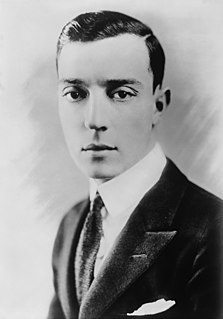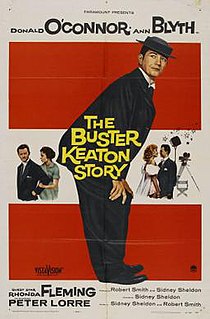Related Research Articles

Joseph Frank "Buster" Keaton was an American actor, comedian and filmmaker. He is best known for his silent film work, in which his trademark was physical comedy accompanied by a stoic, deadpan expression that earned him the nickname "The Great Stone Face". Critic Roger Ebert wrote of Keaton's "extraordinary period from 1920 to 1929" when he "worked without interruption" as having made him "the greatest actor-director in the history of the movies". In 1996, Entertainment Weekly recognized Keaton as the seventh-greatest film director, and in 1999 the American Film Institute ranked him as the 21st-greatest male star of classic Hollywood cinema.

Neighbors is a 1920 two-reel silent comedy film co-written, co-directed by, and starring Buster Keaton.

Three Ages is a 1923 black-and-white American feature-length silent comedy film starring comedian Buster Keaton and Wallace Beery. The first feature Keaton wrote, directed, produced, and starred in, Keaton structured the film like three inter-cut short films. While Keaton was a proven success in the short film medium, he had yet to prove himself as a feature-length star. Had the project flopped, the film would have been broken into three short films, each covering one of the ages. The structure also worked as a parody of D. W. Griffith's 1916 film Intolerance.
Seven Chances is a 1925 American silent comedy film directed by and starring Buster Keaton, based on the play of the same name by Roi Cooper Megrue, produced in 1916 by David Belasco. Additional cast members include T. Roy Barnes, Snitz Edwards, and Ruth Dwyer. Jean Arthur, a future star, has an uncredited supporting role. The film's opening scenes were shot in early Technicolor.

Back Stage is a 1919 American two-reel silent comedy film directed by and starring Roscoe "Fatty" Arbuckle and featuring Buster Keaton and Al St. John.

Go West is a 1925 American silent Western comedy film directed by and starring Buster Keaton.

The Garage is a 1920 American two-reel silent comedy film directed by and starring Roscoe "Fatty" Arbuckle and featuring Buster Keaton. This was the fourteenth and last film starring the duo before Keaton set up his own studio and Arbuckle started making feature-length films. The film also stars Luke the Dog, who starred in many other short comedies with Arbuckle. The film was also known as Fire Chief.

The Rough House is a 1917 American two-reel silent comedy film written by, directed by, and starring both Roscoe "Fatty" Arbuckle and Buster Keaton. The Rough House was Keaton's first film as a director.

His Wedding Night is a 1917 American two-reel silent comedy film written, directed by, and starring Roscoe "Fatty" Arbuckle.

Allez Oop is a 1934 American short comedy film starring Buster Keaton. It was the second film Keaton made for Educational Pictures.
One Run Elmer is a 1935 American short comedy film featuring Buster Keaton, and directed by Charles Lamont.
Hayseed Romance is a 1935 American short comedy film featuring Buster Keaton.
Tars and Stripes is a 1935 American Educational Pictures short comedy film directed by and starring Buster Keaton. The film was shot at the Naval Training Center San Diego, California.
The E-Flat Man is a 1935 American short comedy film featuring Buster Keaton.

The Timid Young Man is a 1935 American short comedy film directed by Mack Sennett and starring Buster Keaton.
Grand Slam Opera is a 1936 American short comedy film starring Buster Keaton.
Blue Blazes is a 1936 American short comedy film directed by Raymond Kane and starring Buster Keaton.

What - No Beer? is a 1933 Pre-Code comedy film released by Metro-Goldwyn-Mayer directed by Edward Sedgwick and starring Buster Keaton and Jimmy Durante. MGM had also paired Keaton and Durante as a comedy team during this period in The Passionate Plumber and Speak Easily.

The Buster Keaton Story is a 1957 American biographical drama film directed by Sidney Sheldon and written by Sidney Sheldon and Robert Smith, following the life of Buster Keaton. The film stars Donald O'Connor, Ann Blyth, Rhonda Fleming, Peter Lorre, Larry Keating and Jackie Coogan. It was released on April 21, 1957, by Paramount Pictures. The film was described by AllMovie as "sublimely inaccurate" regarding details of Keaton's life. It was produced by Paramount Pictures, which paid Keaton $50,000 for the rights to his life story.
References
- ↑ "NY Times.com: Three on a Limb". Movies & TV Dept. The New York Times . Baseline & All Movie Guide. 2012. Archived from the original on October 26, 2012. Retrieved January 5, 2010.